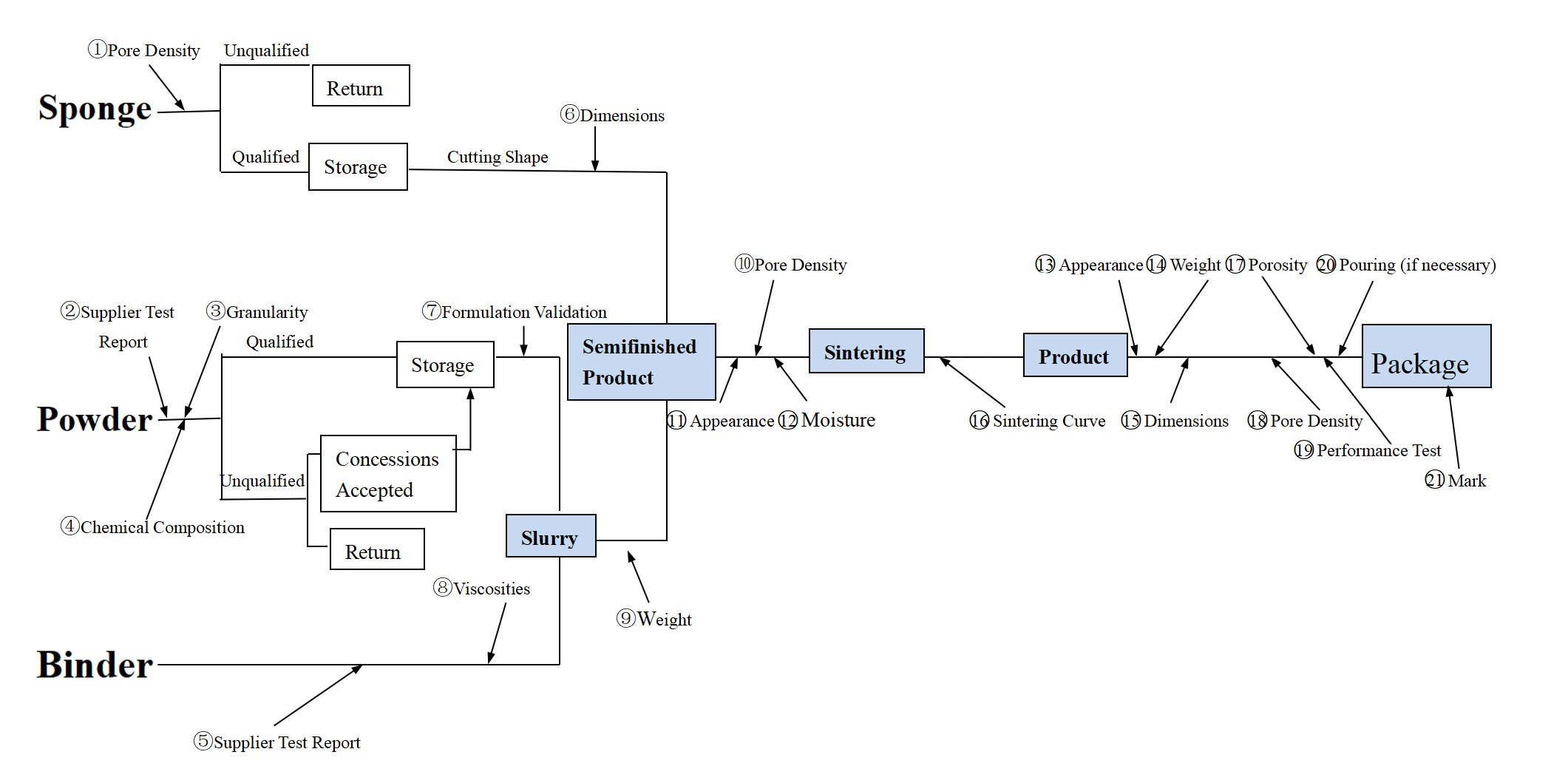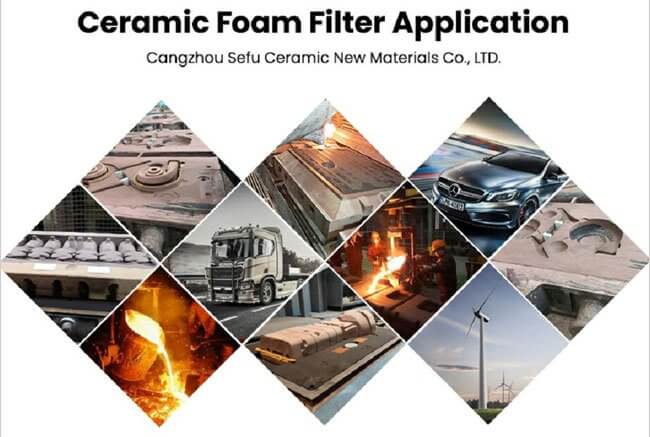In the realm of metal casting and filtration processes, advancements in material science have led to the development of innovative solutions to address various challenges. One such breakthrough is the silicon carbide foam filter—a versatile material that has transformed metal casting and filtration by offering enhanced efficiency, improved quality, and increased sustainability. This article delves into the world of silicon carbide foam filters, exploring their properties, applications, benefits, and potential future developments.
Properties of Silicon Carbide Foam Filters:
Silicon carbide (SiC) foam filters are a unique class of ceramic filters that combine the advantageous properties of silicon carbide with the open-cell structure of the foam. This results in a porous and lightweight material with exceptional thermal stability, mechanical strength, and chemical resistance. The microstructure of SiC foam filters consists of interconnected pores, forming a three-dimensional network that provides an ideal pathway for molten metal to flow while effectively trapping impurities and solid particles.
Manufacturing Process of Silicon Carbide Foam Filters:
The manufacturing process of silicon carbide foam filters involves several key steps. It begins with the production of a polymer foam template with the desired pore structure. This template is then coated with a slurry containing silicon carbide particles and binders. After coating, the slurry-coated foam template is heated to burn off the polymer, leaving behind a porous ceramic structure composed primarily of silicon carbide. The final product can vary in terms of pore size, thickness, and density, allowing manufacturers to tailor the filters to specific applications.

Applications in Metal Casting:
Silicon carbide foam filters find extensive use in the metal casting industry, where they play a crucial role in improving the quality of castings. During the casting process, molten metal often contains impurities and solid particles that can lead to defects in the final product. SiC foam filters act as effective barriers, capturing these impurities and allowing only clean metal to flow through the filter’s pores. This results in castings with reduced defects, improved surface finish, and enhanced mechanical properties.
Benefits and Advantages of Silicon Carbide Foam Filters:
The utilization of silicon carbide foam filters offers a range of benefits across various industries:
Improved Casting Quality: By effectively removing impurities and solid particles, SiC foam filters contribute to higher-quality castings with fewer defects.
Enhanced Productivity: The filters’ ability to increase casting yield and reduce scrap rates translates into improved production efficiency.
Extended Equipment Lifespan: The chemical and thermal stability of silicon carbide ensures the filters can withstand the harsh conditions of metal casting processes without significant deterioration.
Environmentally Friendly: SiC foam filters contribute to a reduction in material wastage and energy consumption, aligning with sustainability goals.
Applications Beyond Metal Casting:
While silicon carbide foam filters have a primary role in metal casting, their unique properties have sparked interest in other applications:
Thermal Insulation: The excellent thermal stability and insulating properties of SiC foam make it suitable for high-temperature insulation in furnaces and industrial equipment.
Filtration in Chemical Processing: SiC foam filters can be used in chemical processing to separate solids from liquids, owing to their porous structure and chemical resistance.
Aerospace and Automotive: The lightweight nature of SiC foam filters makes them attractive for applications in the aerospace and automotive industries, where weight reduction is essential.

Future Developments of Silicon Carbide Foam Filters:
As technology continues to evolve, the potential for advancements in silicon carbide foam filters remains promising. Researchers are exploring ways to optimize the pore structure, enhance filtration efficiency, and expand the range of metals that can be effectively filtered. Additionally, innovations in manufacturing techniques and material formulations may lead to cost reductions, making SiC foam filters more accessible to a broader spectrum of industries.
Filter Performance and Optimization:
The performance of silicon carbide filters depends on several factors, including the pore size, density, and thickness of the filter. Engineers and researchers work to optimize these parameters to achieve the desired filtration efficiency for specific casting processes. A finer pore structure can effectively capture smaller impurities, while a coarser structure might be preferred for larger particles. The density and thickness of the filter influence the flow rate of molten metal and the overall effectiveness of impurity removal. Striking the right balance between these factors is crucial to achieving optimal casting results.
Customization for Specific Alloys:
Different metal alloys have varying characteristics, including melting points, fluidity, and impurity content. Silicon carbide foam filters can be customized to cater to the unique requirements of specific alloys. By tailoring the filter’s properties to match the alloy’s characteristics, manufacturers can enhance the overall casting process and achieve superior results. This customization might involve adjusting the filter’s pore size distribution, which can impact the filtration efficiency and the flow of molten metal.
Advancements in Manufacturing Techniques:
The manufacturing process for silicon carbide filters continues to evolve, leading to improvements in filter quality, consistency, and cost-effectiveness. Advanced techniques, such as additive manufacturing (3D printing), are being explored to produce intricate filter structures with precise pore sizes. This innovation not only allows for greater design flexibility but also reduces material waste during production. As manufacturing processes become more refined, the accessibility of silicon carbide filters may increase, making them more viable for a wider range of applications.
Environmental Impact:
One of the notable advantages of silicon carbide foam filters is their positive impact on environmental sustainability. By reducing scrap rates and improving casting quality, these filters contribute to lower material wastage. Moreover, the energy savings associated with fewer defects and increased casting yield can lead to a more efficient use of resources. As industries continue to prioritize sustainability, the adoption of silicon carbide filters aligns with eco-friendly practices.
Collaborative Research and Innovation:
The field of silicon carbide filters is ripe with opportunities for collaborative research and innovation. Manufacturers, researchers, and engineers from diverse industries can collaborate to explore novel applications, refine filter designs, and address existing challenges. Cross-industry partnerships can accelerate the development of new materials, manufacturing techniques, and applications that leverage the unique properties of silicon carbide filters.
Conclusion:
Silicon carbide foam filters have emerged as a transformative technology in the realm of metal casting and filtration. Their exceptional properties, including thermal stability, mechanical strength, and chemical resistance, make them invaluable tools for enhancing casting quality, increasing productivity, and promoting sustainability. As industries continue to seek innovative solutions, silicon carbide filters are poised to play a pivotal role in shaping the future of material processing, manufacturing, and beyond. With ongoing research, technological advancements, and cross-industry collaboration, these filters have the potential to unlock new possibilities and revolutionize various sectors.


